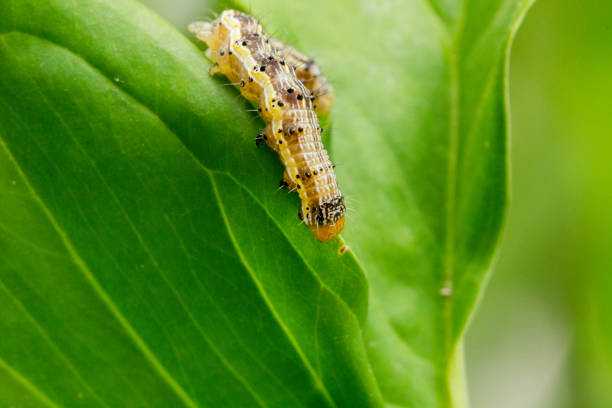
Scientists Used CRISPR-Cas9 to Remove Caterpillar's Ability to Silence a Plant's Defense Alarm
February 24, 2021| |
Scientists from Penn State University used CRISPR-Cas9 to successfully produce caterpillars that lack a specific enzyme that inhibits the plant's response to alert neighboring plants of the presence of herbivores nearby.
The study identified an enzyme, glucose oxidase (GOX), found in the saliva of tomato fruitworm caterpillars. GOX was found to be responsible for the closing of the stomata in plants preventing its plant defensive emissions known as herbivore-induced plant volatiles (HPV).
The scientists observed and monitored the caterpillars with and without GOX enzyme in three separate glass chambers containing tomato, soybean, and cotton. They found out that GOX enzyme not only caused stomatal closure but also inhibits the release of HPV in tomato and soybean plants only. The scientists concluded that GOX affects specific species of plants only.
The study could provide a deeper understanding of the evolutionary trait of herbivores and the ability of agricultural crops to withstand additional stressors such as climate change.
For more details, read the article in New Phytologist.
| |
You might also like:
- Bt Sweet Corn Can Reduce Insecticide Use
- Development of Powdery Mildew Resistant Tomato via CRISPR-Cas9
- Geneticists Use CRISPR to Correct Tomato Breeding Conflict
Biotech Updates is a weekly newsletter of ISAAA, a not-for-profit organization. It is distributed for free to over 22,000 subscribers worldwide to inform them about the key developments in biosciences, especially in biotechnology. Your support will help us in our mission to feed the world with knowledge. You can help by donating as little as $10.
-
See more articles:
-
News from Around the World
- 24 World Food Prize Laureates Urge U.S. President to Make Fighting Global Hunger Top Priority
- GM Maize for Human Consumption Show Higher Yield Gains than Maize for Livestock in South Africa
- Cuba's Scientific Biotech Official Backs Safety of Transgenic Crops
- Researchers Identify Key Herbicide Resistance Gene in Ryegrass
- Awareness of GM Rice's Benefits Affects Public Acceptance in Malaysia
- Researchers Develop Cavendish Bananas Resistant to Panama Disease
- Webinar: Global Status of Biotech Crops and the Oceanian Biotech Perspective
- Researchers Discover Gene Promoting Rust Fungal Infection in Wheat
- German Researchers Use Optogenetics to Activate Plant Cell Activities
-
Research Highlights
- Biotech Tools to Boost Essential Amino Acids in Maize
-
Plant
- Scientists Used CRISPR-Cas9 to Remove Caterpillar's Ability to Silence a Plant's Defense Alarm
- MitoTALENs Enable More Understanding of Plant Mitochondrial Genomes
-
Read the latest: - Biotech Updates (February 11, 2026)
- Gene Editing Supplement (January 28, 2026)
- Gene Drive Supplement (February 22, 2023)
-
Subscribe to BU: - Share
- Tweet

